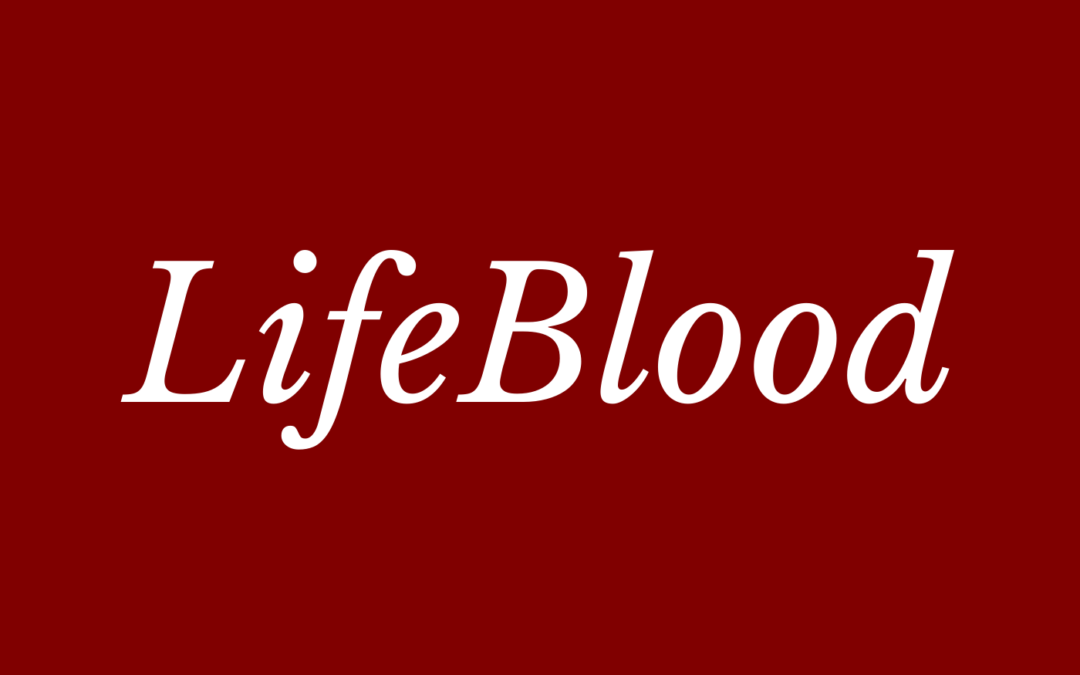How to Publish a Book with Tom Freiling
Got an idea or manuscript, but don’t know how to publish a book? Tom Freiling shares his expertise into how the process has changed and what the future holds!
Listen to us On
About the Episode
LifeBlood: We talked about how to publish a book, how the book industry has changed and evolved over the past 30 years, what book publishers do, how to publish your next book, and what proper expectations are with Tom Freiling, CEO of Freiling Publishing, author and member of the John Maxwell team.
Listen to learn why flexibility is key to all of life’s endeavors, and why it’s important to not be married to your ideas!
You can learn more about Tom at FreilingPublishing.com and LinkedIn.
Thanks, as always for listening! If you got some value and enjoyed the show, please leave us a review wherever you listen and subscribe as well.
You can learn more about us at LifeBlood.Live, Twitter, LinkedIn, Instagram, YouTube and Facebook or you’d like to be a guest on the show, contact us at contact@LifeBlood.Live.

George Grombacher
Lifeblood Host

Tom Freiling
Guest
Episode Transcript
george grombacher 0:00
Come on
one level, this is George G. And the time is right welcome. Today’s guest is strong and powerful Tom frei like Tom, are you ready to do this? I’m ready, George. Let’s do it. Alright, let’s let’s go. Tom is the CEO of frylinck Publishing. He’s a veteran book publisher. He’s a published author himself. He is a member of the John Maxwell team excited to have you on. Tom, tell us a little about personal life’s more about your work and why you do what you do. Yeah, sounds good personal life. Well, my husband and a dad live in the Washington DC area. Although I say Washington DC we’re at we’re a bit out. We’re about 50 miles west of almost into the mountains. So live in more of a rural community moved out here about seven years ago to get out of the hustle and bustle and the mess called Washington DC, the zoo called Washington DC. So yeah, I love to fish and love to camp when I can. And yeah, just have a good time. Nice. I appreciate that. You’ve been you’ve been in the book publishing world for a long time. How did you get started in that? Man, I got started by accident, I took a job as a telemarketer for a book publisher. This was back when there were you know, maybe 20 or 30,000 bookstores in the United States. And I just spent all day getting on the phone with bookstore owners and selling them books. And the rest is history. I’ve been involved in book publishing in some fashion or form ever since telemarketing. So you’re just constantly calling on local bookstores. 20,000. This is when they took the calls. And they look forward to talking to publishers about what’s you know, what their new releases are in such and they would buy, you know, loads of books by telephone. And I missed those days. Actually, those were really fun days in the world of book publishing and bookselling
Tom Freiling 2:01
is, is there a right time to look to and say this was the golden age of book publishing? Or are we there? Now? I guess it’s depends on your perspective. You know, there are more books being sold now than ever before, unquestionably. But it is a different landscape. You know, the biggest difference being the bookstores were once the gatekeepers of the books selling world and they are no longer of course, Amazon is primarily not exclusively, but primarily so I guess it just depends on your perspective, some would say that now is the Golden Age. I would probably say that when bookstores were alive and well was, at least from my perspective, was the golden age. Yeah, that’s really interesting.
I probably would have said that the publishers were the gatekeepers. Hmm. Well, yes. And no. You know, it was the bookstores who decided what was going to get on the shelf? Yeah. And it was the bookstores, who decided what was going to be placed in the front of the store? Which books were going to be, you know, sideways on the bookshelf? Which ones were phased out? So they really did. They had a lot of power, I guess you would say, and they were also on the front lines with the customers. So a lot of times, bookstores could tell us, the publishers, what was working what was not working, sometimes they would have some of the best ideas, because you know, they’re the ones interacting with the customers. So in that way, publishers are not the gatekeepers. And I would say even today, even more so because there’s a lot of other ways to publish a book now than there used to be you do not necessarily have to use a book publisher anymore. You can do it on your own. Yeah. Interesting. So you mentioned that, that when you were making those phone calls, there were 20 to 30,000 bookstores, how many are there now?
Um, man, I don’t have an exact count, or there’s less than 5000. But you know, a lot of those are, are may not actually be bookstores per se. They might be gift shops, or, you know, similar stores that carry books. And some of this, some of the independent stores are very small. And so, you know, we only have a couple of big chains left Barnes and Noble. There are some Books a Million stores left. But you know, as far as the big chains go, those are primarily gone all so
george grombacher 4:27
yeah, it’s been it’s it’s certainly been an interesting experience. And for me, just casually for you this is this is certainly what you do. So you mentioned that there are more books being sold today than ever before.
Tom Freiling 4:41
Yes, significantly more. And since the pandemic, a significant increase, you could probably say a huge increase in book sales since February 2020. So and I you know, I think you can there’s several reasons for that, number one, people just have more time at home than they used to, they’re not going out as much. So they’re reading more. And I think for a lot of people, the last couple years has been a huge transition, and a huge challenge. And a lot of times people will turn to books for help on trying to figure out their problems trying to figure out their future. So And the third reason is children have been at home a lot more. So children’s books, juvenile books, books for kids, they have skyrocketed in sales over the last two years.
george grombacher 5:32
Well, I’m certainly glad to hear that. Honestly, I think that that’s, that’s, that’s certainly a positive thing. For sure. How have how have podcasts impacted affected books?
Tom Freiling 5:44
That’s a great question up in a pretty significant way, I would say, back in the quote, unquote, the day, it was all TV and radio, and you were somewhat limited, because there were only so many radio programs, and they tended to be more, I guess, generic in nature, whereas today’s podcasts are more niche. So and books are niche. So if you know if you have written and published a book, let’s say a business book, for example, in that category where there’s a lot of podcasts that cater to business people, right. So in that way podcasts, I would say one of the leading vehicles for authors to talk about their books and get the word out on their books. So it’s definitely been it’s been awesome.
george grombacher 6:28
Yeah, yeah, fascinating. We’ve certainly had, I don’t even know, hundreds of authors probably certainly on the show. And it’s been a really neat experience just to be able to learn about their motivation for writing the book and learn about their process for writing, and, and all that good stuff. In now, I want to learn a lot about what it is that you’re doing now. Pardon me, but I also want to learn about moving forward as as as you’re reading the tea leaves when we have things like like NF T’s, and just the world seems to be changing faster and faster and faster, what you see as the future of book publishing.
Tom Freiling 7:09
Yeah, it’s the wild west for sure. But you know, it’s interesting, I’ve been asked this question or similar question for about 15 years or so maybe even longer when, when the e book came out, right. And at the end of the day, not a heck of a lot has changed, you know, there are ebooks or audiobooks. You know, one of the one of the changes in audio books soon will be that they won’t, the narrators won’t be real life voices anymore. The technology is I understand about 12 to 24 months away from the voices being completely, what would you call them? Well, they’re bots. But you can hardly tell a difference, you can’t tell the difference at all. Um, but at the end of the day, it’s, it’s this that still sells, it’s the print book. And the old fashioned paper, you know, bound print book 80 to 90% of our sales are still print books, it’s not ebooks, it’s not audio books, it’s still print. So whatever the future holds for book publishing, I can guarantee you at the end of the day, it’s the end result is going to be books that are printed and bounded paper. And that’s, that’s what people like to read. So, yeah, there’s gonna be a lot of things are gonna happen, probably a lot of unpredictable things. But I can guarantee you at the end of the day, it’s just the old fashioned print paper books that people are gonna be reading.
george grombacher 8:28
Yeah. I’m gonna be around for a little while longer anyway, so I think so. I think so. Yeah. Good enough. So you are, and have been now since you started making those phone calls. However, many years ago that was and now I’m sure that you’ve been involved with writing tons of books and the published tons of books. For somebody that says, you know, Tom, I’ve been thinking about writing my own book. What What? What is your advice to them?
Tom Freiling 8:59
Mm hmm. Good question. Another question I’m asked frequently, I’m number one, I’d get some help find success. Find somebody with real experience to help you with the process. Don’t try to do it on your own. We do live in an age of, you know, DIY, do it yourself, right. But I advise people not to do that. Find somebody who really understands what they’re doing. And secondly, you got to think about the reader when you write you have to think about your audience. Oftentimes, writers end up writing to themselves, not to the reader. readers read books, in my opinion, for two reasons to solve a problem, or to escape a problem. That’s why fiction is so popular. It’s an escape, it’s like going to the movies. But a lot of us turned to books to fix things in our lives. So you have to think about the problem or problems the reader is experiencing and then write it in such a way that they’re going to They’re going to be able to fix or somehow solve their problem. A lot of people write books about their own stories, their own life experiences, which is good. But you have to make sure to, to extend that and not just tell your story, but tell it in a way that the reader is going to find ways to use your story to improve their life.
george grombacher 10:20
Nice. I appreciate that. Can anybody write a book? Do I need to have a background writing?
Tom Freiling 10:28
I would say no. It’s like, it’s like asking, can anybody paint up painting? Well, I guess anybody could. I don’t know that anybody just anybody could write a good book. That being said, everybody can try, maybe everybody should try. There certainly are many examples of of best selling books that were written by folks who never wrote before, or didn’t, you know, write much before. So I guess some encouragement and some discouragement. I think it perspective is important, you know, I get, you know, sometimes authors will tell me their book is gonna sell a million copies. And it might, but you got to watch your perspective and your expectations on that. Keep them realistic.
george grombacher 11:12
Yeah, I appreciate that. It would be awesome for everybody if they did sell knowing copies. So let’s talk a little bit about that. Let’s talk about why people are writing books these days, the kind of books that you are helping people to write, and then how you set proper expectations.
Tom Freiling 11:34
Again, most most of the time, authors writers are writing out of their own life experiences. And I think some of that is almost therapeutic, it is therapeutic actually to write about your life experiences. That’s the primary reason why why, you know, people write books. And usually they’ve overcome something right around the, the back side or key other than backside, the back end of what they’re they struggled with, or maybe they’re in the middle of a struggle, you know, I don’t know. But that’s the primary, you know, primary reason why why people write books, they want to tell their story. And and it’s a good reason, it’s a great reason, again, you have to make sure to tell it in such a way that the reader is helped by it. But you know, that’s, that’s most of the time. That’s why people come to me and asked me for their help in writing and publishing their book.
george grombacher 12:26
And so you say, Great, this is a you have an amazing story. I think that’ll really resonate with people. How do you then we’ll kind of walk me through those steps. It’s I’m sure it’s setting a timeline, it’s figuring out, like, how many are we really going to try to sell? How are we walked me through all that?
Tom Freiling 12:46
Yeah, you know, the average book today sells between two and 3000 copies. So that’s average, you know, a lot of books don’t even sell that many. Now, some will sell in the 10s, or hundreds of 1000s. I tell authors, it’s a marathon and not a sprint. There are many occasions when a book doesn’t catch on right away. But you know, a book is always new to somebody who’s never read it before. So be patient with the process. There are many stories of books that didn’t sell for years, man, there’s books that didn’t sell well, after the author passed away before they started to sell well. So you have to really keep that, you know, in perspective, unless you’re a big name a celebrity, the, the chances that your book is just going to take off immediately are slim to none. So you know, have patience with it. And remember to that it’s a book, it’s all about the words in the book, right? It’s not a coffee mug, it’s not a gift item, it’s a book, it’s so it’s important to, to in some way, find a way to get your words out there, whether that’s blogging, whether that’s social media, whatever that might be, you got to stay out in front of people. And the best way to do that, as a writer is to keep on writing, and catch people’s attention with your words.
george grombacher 14:05
I think that that makes a lot of sense. Best ways to keep on writing. So does that mean more books? Does that mean? starting a blog? Does that mean all those things?
Tom Freiling 14:15
Yeah, you know, all of those things I do encourage authors to, to blog or, you know, maybe use social media to blog, you know, whether or not you want to put your words on Facebook or in short form on Twitter or whatnot. But yeah, keep on writing, you know, the more you write, the better you get. So, yeah, for sure.
george grombacher 14:34
Nice. And what is, is, is there a typical time that it takes somebody to write a book, the amount of time and then from the time that they engage with you are people often do they have a book written? Are they halfway done?
Tom Freiling 14:48
You know, it’s all of those things. It took JK Rowling 10 years to write her first Harry Potter book, so there is no timeline. I would say that most of the time our authors take about six months. to a year is probably average, six months is pretty fast, we’ve actually done them quicker than that. When authors approached me, it’s it’s one of three things, they’re finished with their manuscript, and they’re ready for it to be edited. They’re halfway there, there’s somewhere in between, or they haven’t started at all. And all of those three situations are fine. We kind of like to be involved as early on in the process as possible. Because we feel like we can add more value to the writing process. And we feel like the book will, will end up being a better book, if we’re involved early on in the project. It’s not always the case. But that’s that’s kind of what we prefer. Yeah, I
george grombacher 15:39
appreciate that. So this is probably a question I should ask right at the top. But what does what does a publisher do?
Tom Freiling 15:46
That’s a great question a publisher. They’re not a printer, by the way, they don’t print books. And they don’t sell books, except to the bookstore. They don’t sell them directly to the consumer, a publisher is a creator of an art form other book, publishers. help authors write and edit good books, right. At the at the end of the day? Well, let me say this, so authors will ask the author on how do I market my book, right? How do I sell my book? My answer is we’ll write a good book. Right? And that’s what publishers do. They they help authors write good books that are going to be marketable. And of course, then, of course, they’re involved in designing that book, right? typesetting, that book, essentially creating the product, and then managing the distribution of that product to the retail environment, right? Whether that be brick and mortar or online. But primarily, you have to look at as a book publisher, as somebody who understands what makes a book sell. And, and then helps you author create that product. It’s not as easy or as simple as you might think it is. So like everything else in life, right? It all looks easy. But but it rarely is. So I don’t know if that helps answer your question. But
george grombacher 17:02
no, it does. I appreciate that perspective. And if anything, I would think it’d be really, really hard to get a book to sell. Because you can write the greatest screenplay in the world, the greatest book in the world, you can be the greatest musician in the world. But if nobody ever hears your music, or read your book, or is aware that it exists, then then it doesn’t really matter. So it’s true. It’s
Tom Freiling 17:21
true. It’s a little harder than music to because, you know, a song is what, 234 minutes, you know. So it doesn’t take nearly as much time to capture somebody’s attention with the songs with a book, right? You know, for somebody to like your book, like I have to spend more than two or three minutes reading it. So it’s more challenging, I would say that that music is
george grombacher 17:41
do you view yourself as a partner to the author, then imagine that they either pay you up front to help you with this? Or how does that work?
Tom Freiling 17:52
Yeah, so we operate in a what’s called a hybrid model. So it sits between traditional publishing and self publishing. But essentially, authors pay us a fee to help them create, publish, distribute and sell their book, we do it like a traditional publisher does it we perform or behave the same way as a traditional house, but we do not assume all of the risk, or at least all of the financial risk. So partnership is a good word to use and, and hybrid publishers tend to give their authors or allow their authors to retain most of the rights to their book, whereas a traditional publisher does not if you signed with a random house or a penguin, you know, you’re going to be sure they’re going to own all the rights to your work, extended all the way to video, audio, ebook motion picture rights. If you publish a book and with let’s say, a Random House, and somebody decides to make a movie based on your book, guess who’s gonna make most of the money? Random House now the author, we don’t do it, we let the author retains all of their rights to their book, but still help them publish it in a traditional manner.
george grombacher 18:59
Nice. I love it. Well, Tom, people are ready for your difference making tip, what do you have for them?
Tom Freiling 19:04
Making tip, I would say be flexible. If I’ve learned anything in 30 years of publishing books, and as an entrepreneur, it’s don’t get too stuck on your own ideas should try to appear around the corner and remain flexible as you continue to build and create and grow
george grombacher 19:23
with that is great stuff that definitely gets Come on. Tom, thank you so much for coming on. Where can people learn more about you and how can they engage with you?
Tom Freiling 19:32
Sounds good. Yeah, just visit my website. It’s frylinck publishing.com. And that’s F r e i l i n g frylinck publishing.com. And we’d be happy to chat with anybody and answer any other questions and talk about your book.
george grombacher 19:46
Excellent. Well, if you enjoyed this as much as I did, show time, your appreciation and share today’s show with a friend who also appreciates good ideas go to frylinck Publishing comm that’s F r e i l i n g publishing.com. and take Tom on up on his offer to explore the process thanks Tom Thanks George Have a great one and until next time keep fighting the good fight we’re all in this together
More Episodes
Beyond the Bank Balance: Cultivating a Soulful Relationship with Money
You don’t need to be a Wall Street shark or a personal finance guru to develop a healthy relationship with money. In fact, most of us start with little more than a jumble of beliefs and habits passed down from our families. But if you’ve ever found yourself stressed...
How Using AI Can Help You Gain Clarity Into Your Financial Future
In today's fast-paced, data-driven world, achieving financial clarity can feel like an overwhelming task. With numerous financial decisions to make—from budgeting and investing to retirement planning and debt management—it's easy to feel lost in the complexity of it...
How AI Can Help Improve Your Personal Finances
1. Smarter Budgeting and Expense Tracking AI-powered tools like Mint, You Need a Budget (YNAB), and PocketGuard can automatically categorize your expenses, track your spending in real time, and even alert you when you’re about to exceed your budget. These tools...
Trust and Confidentiality When Using AI as Your Financial Coach: Safeguarding Your Sensitive Data
In the digital age, artificial intelligence (AI) has revolutionized many aspects of our lives, including personal finance. AI-powered financial tools have become a go-to resource for budgeting, investing, debt management, and even retirement planning. But as more...
How AI Can Be Your Personal Financial Coach: Unlocking the Future of Financial Success
In today’s fast-paced world, managing your finances can feel overwhelming. With so many options for saving, investing, and budgeting, it can be hard to know where to start or how to stay on track. Fortunately, advances in technology—specifically Artificial...
How Technology and AI Are Benefiting Investors and Consumers in Securing Their Personal Financial Futures
In recent years, the rise of technology and Artificial Intelligence (AI) has profoundly transformed the financial landscape. These advancements have empowered investors and consumers to make more informed, efficient, and personalized decisions about their financial...
10 Things New Parents Should Be Thinking About Regarding Their Personal Finances
Becoming a parent is one of the most joyful and transformative experiences in life. However, it also brings new financial responsibilities and challenges. If you’re a new parent or expecting, it’s crucial to plan ahead to ensure your family’s financial security. Here...
10 Things Newlyweds Should Be Thinking About Regarding Their Personal Finances
Marriage marks a new chapter filled with excitement and partnership. While love may be the foundation, financial harmony is key to building a stable and happy life together. To set yourselves up for success, here are 10 essential financial topics that every newlywed...
Financial Tips for New Parents: Building Stability and Security for Your Growing Family
Becoming a parent is one of life’s most rewarding experiences, but it also brings significant financial challenges. From diapers to daycare, the costs add up quickly. Whether you’re a first-time parent or adding to your family, managing finances wisely is crucial for...
Join the show.
Interested in being on the show? Tell me a little bit more about you and what you’d like to talk about!














